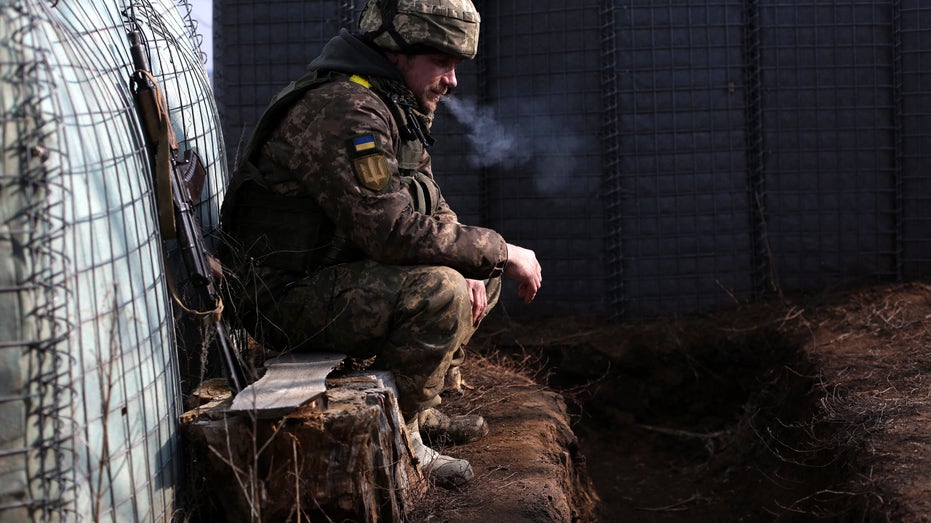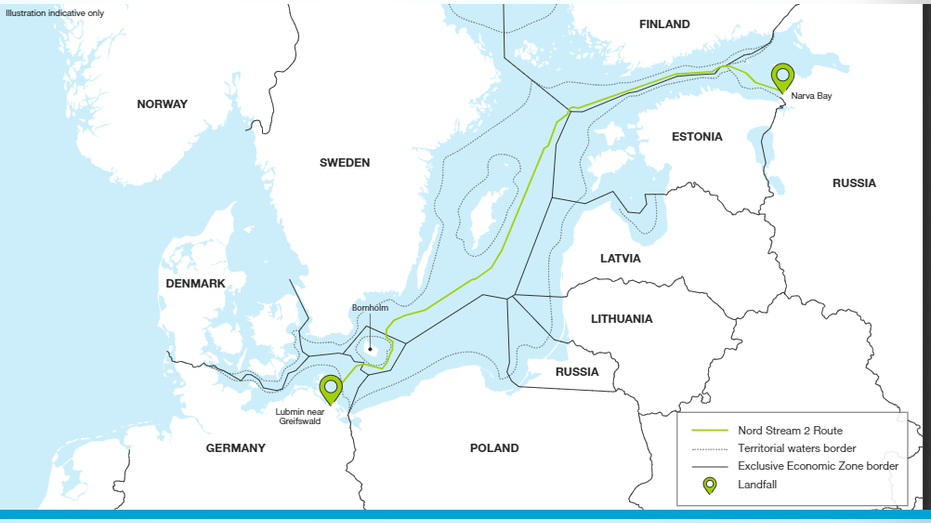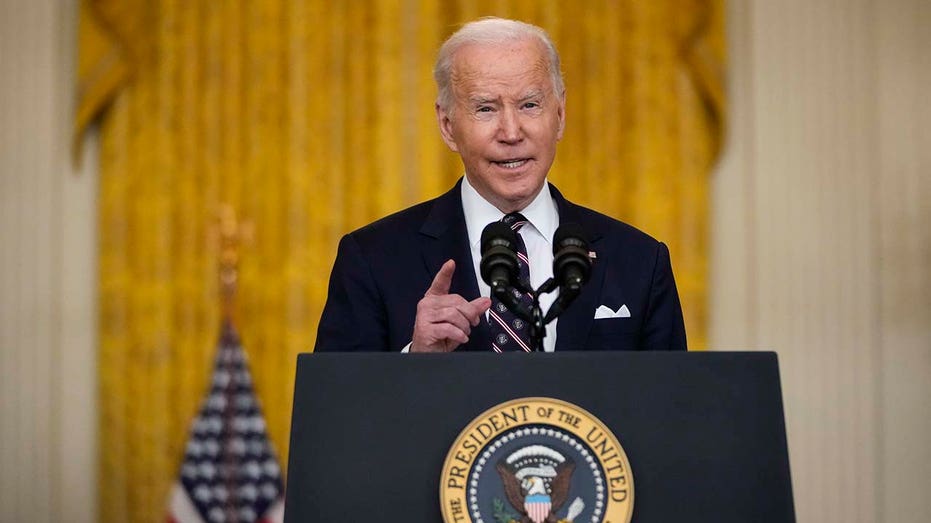Nord Stream 2: What to know about the controversial gas pipeline connecting Russia with Europe
Nord Stream 2 would offer an alternative to Ukraine's aging system
Putin must understand the 'heavy price to pay' if he moves further: Robert O'Brien
Former National Security Adviser Robert O'Brien provides insight on deterring Putin and not recognizing a new leader he could install in Ukraine on 'Kudlow.'
With Russia’s renewed invasion of Ukraine, attention has turned once again to the controversial Nord Stream 2 gas pipeline linking Russia to Europe via Germany.
The undersea pipeline, which is complete but not yet operating, was an irritant in U.S.-German relations well before Russian President Vladimir Putin said he would recognize the independence of the Donetsk and Luhansk areas.

A Ukrainian serviceman smokes at a position on the front line with Russia-backed separatists near the settlement of Troitske in the Lugansk region on February 22, 2022, a day after Russia recognized east Ukraine's separatist republics and ordered the (Photo by ANATOLII STEPANOV/AFP via Getty Images)
Now it’s become a major target as Western governments try to exert leverage on Russia to deter further military moves against Ukraine.
THE RUNDOWN
Nord Stream 2 is a 764-mile-long natural gas pipeline under the Baltic Sea, running from Russia to Germany's Baltic coast.
It runs parallel to an earlier Nord Stream pipeline and would double its capacity, to 110 billion cubic meters of gas a year. It means the Russian state-owned energy company Gazprom can send gas to Europe's pipeline system without using existing pipelines running through Ukraine and Poland.
WHY DOES RUSSIA WANT THE PIPELINE?
State-owned gas giant Gazprom says it will meet Europe's growing need for affordable natural gas and complement existing pipelines through Belarus and Ukraine.
Nord Stream 2 would offer an alternative to Ukraine's aging system that Gazprom says needs refurbishment, lower costs by saving transit fees paid to Ukraine, and avoid episodes like brief 2006 and 2009 gas cutoffs over price and payment disputes between Russia and Ukraine.

Europe is a key market for Gazprom, whose sales support the Russian government budget. Europe needs gas because it's replacing decommissioned coal and nuclear plants before renewable energy sources such as wind and solar are sufficiently built up.
GERMANY’S REACTION TO THE CRISIS
The pipeline has been filled with gas but had been awaiting approval by Germany and the European Commission.
GERMANY PULLS PLUG ON PIPELINE AS RUSSIAN TROOPS SIGHTED IN UKRAINE
On Tuesday, German Chancellor Olaf Scholz suspended the certification process for the Nord Stream 2 natural gas pipeline after Russia recognized separatist-held regions in eastern Ukraine.
Germany's utility regulator was reviewing the pipeline for compliance with European regulations on fair competition. It's that approval process that Scholz said Tuesday that he was suspending.

U.S. President Joe Biden delivers remarks on developments in Ukraine and Russia, and announces sanctions against Russia, from the East Room of the White House February 22, 2022, in Washington, DC. (Photo by Drew Angerer/Getty Images)
Germany was required to submit a report on how the pipeline would affect energy security, and Scholz said that report was being withdrawn.
Though he initially backed the project, Scholz warned that Russia would face "severe consequences" and that sanctions must be ready ahead of time. Germany had agreed with the U.S. to act against Nord Stream 2 if Russia used gas as a weapon or attacked Ukraine.
THE U.S. POSITION ON NORD STREAM 2
Despite strenuous objections, Biden waived sanctions against the pipeline's operator when it was almost complete in return for an agreement from Germany to take action against Russia if it used gas as a weapon or attacks Ukraine.
RUSSIAN LEADER VOWS TO KEEP EUROPE'S GAS DESPITE PIPELINE SANCTIONS
Experts at the time warned that Germany’s deal would allow Russia to supply natural gas would be rewarding Russia for bad behavior after the 2014 annexation of Crimea.

FILE - Pipes at the landfall facilities of the "Nord Stream 2" gas pipline are pictured in Lubmin, northern Germany, on Feb. 15, 2022. (AP Photo/Michael Sohn, File)
European NATO allies and Ukraine, meanwhile, have opposed the project going back before the Biden administration, saying it increases Europe's dependence on Russian gas and gives Russia the possibility of using gas as a geopolitical weapon. Europe imports most of its gas and gets roughly 40% of its supply from Russia.
STOCKS SINK, OIL NEARS $100 PER BARREL AS BIDEN STICKS RUSSIA WITH SANCTIONS
Republicans and Democrats in Congress — in a rare bit of agreement — have long objected to Nord Stream 2.
WILL SUSPENDING NORD STREAM 2 MAKE EUROPEANS FREEZE THIS WINTER?
The approval process was not going to be completed in the first half of 2022 which means it as not going to help meet heating and electricity needs this winter as Europe faces a gas shortage.
The winter shortage has continued to feed concerns about relying on Russian gas. Russia held back from short-term gas sales — even though it fulfilled long-term contracts with European customers — and failed to fill its underground storage in Europe.

Russian President Vladimir Putin listens to a journalist's question during a joint news conference with Hungary's Prime Minister Viktor Orban following their talks in the Kremlin in Moscow, Russia, Tuesday, Feb. 1, 2022. (Yuri Kochetkov/Pool Photo via AP)
Russian President Vladimir Putin has said the shortage underlines the need to quickly approve Nord Stream 2, increasing concerns about Russia using gas to gain leverage over Europe.
COULD RUSSIA CUT OFF GAS TO EUROPE IN RETALIATION?
Many analysts say it is unlikely that Russia would cut off supplies to Europe given the interdependence between the European market and Gazprom.
CLICK HERE TO READ FOX BUSINESS ON THE GO
Meanwhile, the Ukraine crisis, on top of the winter shortage, has already given European governments more reason to find their gas somewhere else, such as through liquefied natural gas brought by ship from the U.S., Algeria, and other places.
The Associated Press contributed to this report.





















